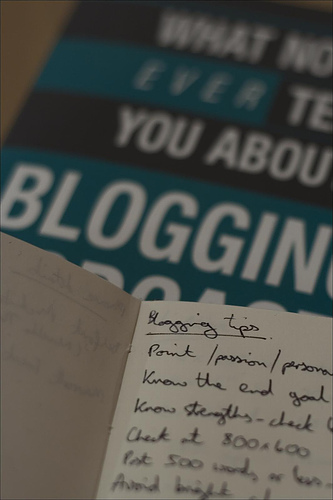So many people have a hard time hashing out blog posts in a consistent and efficient manner, and so I wanted to take a minute to talk a bit more about my own system which I have found can decrease the time between starting a post and publishing it.
The Idea
The first part of posting is to come up with ideas. I sometimes find it necessary to just start writing down words related to my industry and working outwards from there. After coming up with a few different ideas, I bring certain main points together as a single post and I have a fully conceptualized idea.
It can also help to see what other people are writing about. Do you have an opinion? Look back and see what was interesting to people a year ago, two years ago. Have things changed or are they still the same? Some of my favourite posts by authors are the ones where they compare/contrast two different products or two different time periods.
The Questions
Everyone knows about who, what, where, when, why and how, and these questions are infinitely more important when getting ready to post on a blog. They are especially useful when you don’t know everything, and can come up with things you’ll want to research to include in the post.
For example, if you are doing an article about a car company you could easily add information about who designed their main cars? When did they perform the best? How well has the public received their cars? Why are they producing cars with bigger engines than another company? What do you see them dealing with over the next few years?
The Research
Don’t take too much time researching, or you can get bogged down in what others have said. For longer articles, you shouldn’t be spending more than an hour researching for a post. This can be one of the longest time sinks in creating an article. Don’t spend time writing the post as you research, or you can get sidetracked, and unable to create proper flow in your article.
For any niche you should be able to, over a period of time, pick out a few resources that are consistently useful for research, and that will save you massive amounts of time. Try not to stray from these main resources too often, unless you aren’t finding the answers you need. Too much variety, and you can land into information overload world, where nothing productive ever happens.
The Post
The amount of time you need to write an article always depends on its length, but now that you’ve come up with an idea, answered some questions, and completed your research, the words should flow from you. Don’t worry about what you are writing, as you can come back after you are done and edit. The hardest thing I ever learned was not to self edit as I was writing.
As paragraphs are written, your mind will come up with other things to say, and usually, if you are properly prepared, the article will flow together nicely.
You should easily be able to tell how long your article is going to be by this point, and don’t try to push it too far beyond that point, or you’ll find yourself adding useless filler. Brevity can be just as important as details, but with the attention span of most people dwindling, shorter is most likely better.
The Call to Action
After you have written, and edited the post, I always suggest going back and adding in a call to action. It might be a question at the end of the post, links to further reading, or just a simple request to have people comment. You are much more likely to have people act upon what they read, if you ask them to.
I enjoy asking people to comment. I want them to know that I’d love to see them participate if they have any thoughts on what I’ve written. Some bloggers put in affiliate links, strange questions, or a list of other articles they have written along the same lines. These can all be important to increasing the longevity of an article online.
The Pretty Additions
Now you are ready to add in links, images, proper text formatting of headings and whatnot. This doesn’t have to be perfect, but it will add some pizazz to your article. Don’t give it too much time. You can edit articles after they have been published, but no one can see the content until it is published. Far too many people play with formatting for so long that the information that they wanted to share becomes stale.
I take the time to set proper headings, bold certain lines of text, italicize what I think would work best, work on the coding for my lists, and insert block quotes at this point.
The Publishing and Promotion
Once everything else is complete, publish. Your articles don’t do you any good unpublished. Get them out into the world. Feel free to edit them after the fact, or to write whole new articles giving more details, or adding onto your original points.
Don’t forget to let the world know about what you’ve written. Don’t be shy. People are hungry for new content, new ideas, and new perspectives, so find a way to get your work to them. The best thing a writer can receive is constructive criticism on how to improve, so open yourself up to that.
Conclusion
If you are trying to merge all of these steps into one, you might find your articles taking forever to craft and it is fairly easy to see why. There are so many areas between crafting the idea and publishing that breaking it down is really the only way to remain consistent and efficient.
Post inspired by Tom Leroux, check out his blog Leroux.ca.
Originally posted on May 11, 2011 @ 7:30 pm
